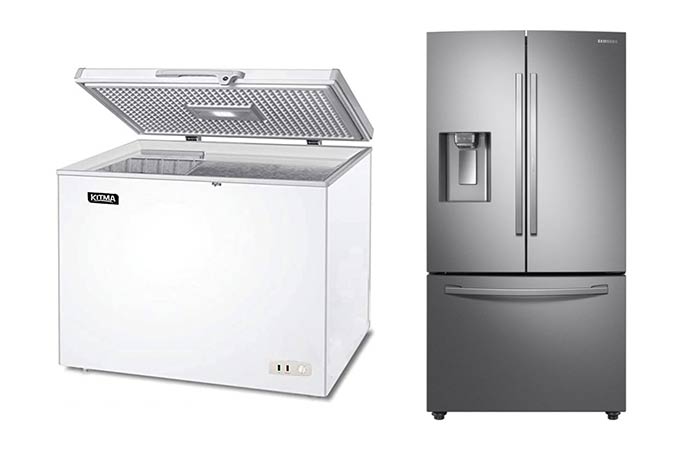Refrigerators or freezers keep your food, both raw and cooked, fresh and longer. It is for this reason that a generator is essential especially if you are living in an area with unstable sources of power.
Generator/freezer brands are built and work differently, and come in different wattage hence there is no single size generator that can run them efficiently. However, when looking for a generator that will start and run either your refrigerator or freezer or both, consider the starting and running wattage for both appliances.
Usually, the starting wattage is usually higher than the running wattage. For this reason, you should always check the wattage on your electronics and make sure the generator you get accommodates both voltages. To be on the safe side, get a generator that offers a bit more than what the refrigerator or freezer requires. This will allow you run it without an issue.
In this guide, we focus on the 120-volt plug-in appliances. You should have your manual with you since you’ll need to take some readings and identify the type or fridge or freezer we have since some seemingly similar models which are different in their working mechanisms and power requirements.
Size of Generator to Run Refrigerator
One refrigerator differs from the other in various aspects one of which is the wattage rating. If the generator you’re looking for doesn’t already have a plate with the wattage written on it, you can get it from the manual.
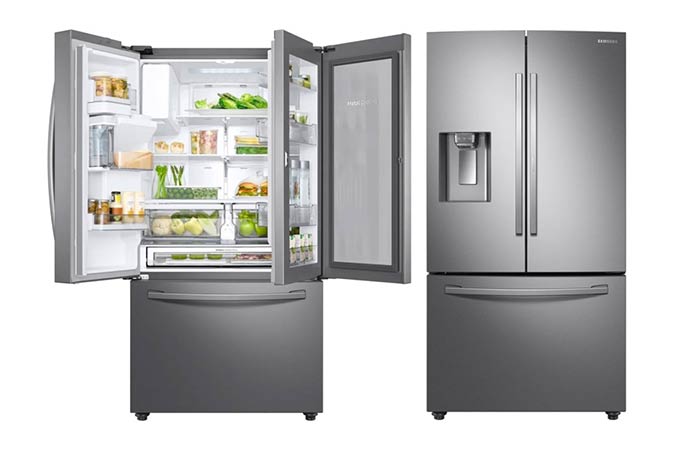
On the readings you’ll see the starting watts and the running watts. These two mean the following:
- Starting/surge wattage: this the amount of energy needed to start an appliance.
- Running/rated wattage: the amount of energy needed to run the appliance after the initial startup.
The starting wattage is usually higher than the running wattage and is the one you need to focus on. Refrigerators can be rated anything from 400 to 2000 starting watts. Essentially, a generator with a wattage rating equal to the starting wattage of an appliance will be able to start and run the appliance.
For example, a fridge rated at 1000 starting wattage can be started and run by a generator rated 1000 watts. To be on the safe side, get a generator with at least 10% more power output that what your fridge needs. For a 1000W appliance, get one that is (110%*1000=) 1100 watts.
Size of Generator to Run Freezer
The workings of a freezer are almost similar to that of the refrigerator and a lot of the aspects discussed above also apply to the freezer. That includes the starting and running wattage ratings. You should know, however, that freezers require more power than fridges both at the start and when running. They range in watts from about 600 watts to more than 2000 watts depending on the size.
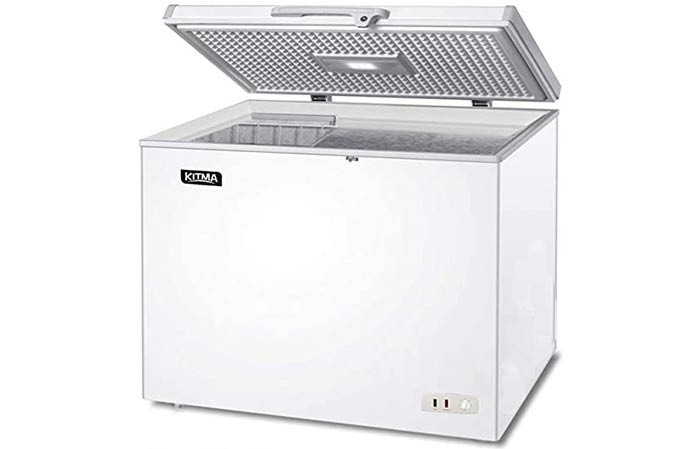
For a freezer rated 1000 starting watts, only a generator with an output of at least 1000 watts will be able to start and run it. Again, getting a freezer with more than 10% of the power required by your appliance is a safe bet as it ensures you’re able to meet the power needs of the appliance and some more.
Size of Generator for Both Freezer and Refrigerator
For any number of electronics, calculating the amount of power output needed requires adding the wattage of each equipment then establishing the total. In this case, with the starting wattage always being higher than the running wattage, you should add the starting wattage of the freezer and fridge to find the power needed.
For example, if you have a freezer with a starting wattage of 1000 watts and a refrigerator with a starting wattage of 1500 watts, their total wattage will be (1000+1500=) 2500 watts. Your generator should thus be at least 2500 watts.
Again, always get a generator with a higher power output than what you need. In this case, a generator with more than 10% of the needed power will be (110%*2500=) 2750 watts. If you get a generator with less power output than the required, the electronics will try starting but the voltage will drop. The motors will then overheat and likely burn out.
Factors that will determine the size (power) of the generator
For any generator intended to provide power for the home or business, always consider the factors below before making the purchase:
The power required
The most important thing you should consider is the amount of power you need. To decide on this one, you need to find the starting wattage for each piece of equipment then add them together to find the total wattage required.
As noted earlier on, always focus on the starting wattage since all equipment require more starting power than running power. As such, if your generator can start the freezer or fridge you have, it can definitely run it.
When choosing the wattage of the generator, provide some extra watts above what you need. This will allow your generator to accommodate an extra load without an issue. Using a generator that doesn’t meet the power requirements will likely damage your electronics.
The type of electronics to be run by the generator
You may have noticed that electrical appliances which look almost similar may have different power ratings. This can be due to the type of parts used in the electronic. One major difference is that appliances that rely on a motor to run require way more power to start than those without a motor. On average, a motor-driven appliance will require a least 4 times the starting power to start than the power needed to run it.
For example, a motor-driven appliance with a running wattage of 500 watts will require (500*4=) 2000 watts to start. Most motor-driven appliances are listed in horsepower rather than in watts. To determine the size of the generator you’ll need to run them, convert the horsepower into watts as shown below:
| Horsepower | Starting wattage | Running wattage |
| 1/6 | 1,000 | 215 |
| 1/4 | 1,500 | 300 |
| 1/3 | 2,000 | 400 |
| 1/2 | 2,300 | 575 |
| 1 | 4,000 | 1,000 |
| 5 | 18,000 | 4,500 |
| 7.5 | 28,000 | 7,000 |
| 10 | 36,000 | 9,000 |
By estimation, 1 mechanical horsepower is equal to 745.7 watts. As such, simply take the horsepower rating then multiply it by 746 to get the wattage needed.
Modular capability
Modular capability refers to the ability to connect one generator with others to provide a single power output. Even when you’re starting off with a single generator, getting one with modular compatibility protects you from having to buy a whole new bigger generator when your power needs surpass the amount provided by the current generator.
Besides having modular compatibility, the generator should be easy to connect to others. The best generators for this role take just about 10 minutes to link them together. Having smaller generators with mid-level power output makes it easy to upgrade than having to go for a large one at once due to cost issues.
Having generators with modular compatibility also helps provide reliable power as one unit failing simply transfers the load to another generator with the result that reliable power will be provided. You’ll also save on fuel as only the required power will be provided as the extra generators will be shut off automatically. Lastly, the time and money required to service the generators will be greatly reduced compared to having one large unit.
Physical size and mobility
The size of your generator doesn’t always translate to the amount of power it’ll generate. However, there is a direct relationship between size and power output for most generators. In this regard, you have a choice between buying one large generator with enough power to power all your electronics, or several small ones with modular compatibility but with the needed power output.
If you’re not limited on space, get a generator of any size. If there’s too little space, consider getting a compact generator without compromising on the power output. Consider also features such as modular compatibility, stackable generator models and wheels or forklift slots.
Autonomy and noise level
Autonomy in regard to generators refers to the ability to work on its own. For a freezer or fridge, this is one of the most important aspects to consider since power may go off when there’s no one around to turn the generator on. If it doesn’t turn on by itself, you could lose a lot with the refrigerated items getting spoiled.
In terms of noise, look for the quietest generators with a focus on a noise level that won’t interrupt your business or other activities. Luckily, modern generators are very quiet with some being almost inaudible when running.
Fuel efficiency
Buying a generator to supply power to a freezer or fridge means that it’ll be running for a significant period of time on end. As such, consider the fuel efficiency of the generator to save on your operational costs.
Modern generators are quite fuel-efficient and can even run on both propane and gasoline with propane being cheaper than gasoline. As such, you can get a large generator that won’t cost you much to run when you need backup power.
These aspects will enable you make the right decision when it comes to finding the right size and type of generator for your fridge and freezer.
Fridge & Freezer Generator Models & Brands
Some of the most reliable generators when it comes to running power-hungry and essential electronics such as freezers and fridges include the following:
1. Champion 3400 Dual Fuel Inverter
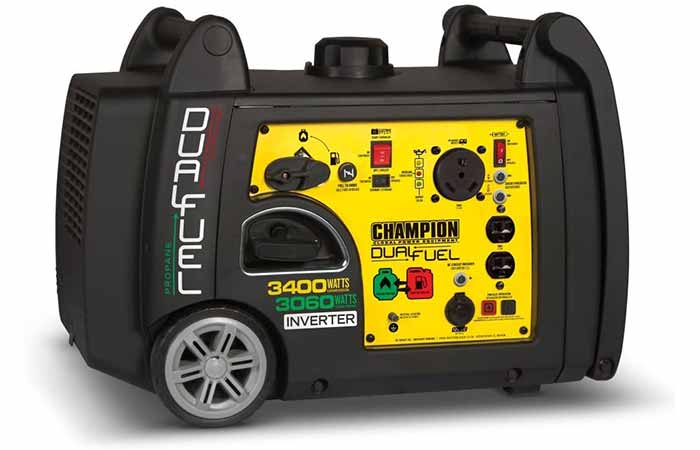
The Champion 3400 has a starting wattage of 3400 watts and 3000 running watts. It runs on either gasoline or propane and is one of the quietest generators at 60dB of noise. It has a continuous run time of 20 hours which is quite impressive. Being an inverter generator, other delicate electronics can also use it.
2. Briggs & Stratton 30795 P4500 PowerSmart Series
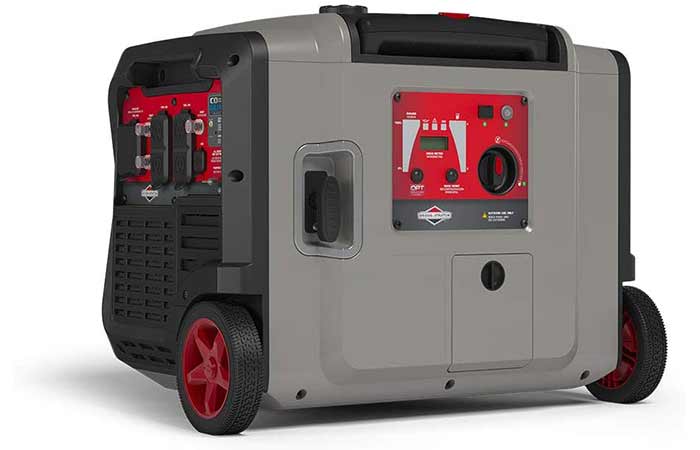
With a push button electric start, the Briggs & Stratton P4500 Power Smart Series inverter generator is ready to go when you need it most. The telescoping handle allows for easy maneuverability, ideal for RV, campsite, and recreational use.
The multi functional display panel monitors power usage, fuel level, and run time. (4) 120V, 20A outlets, (1) 120V, 30A RV outlet, and (2) USB ports allow you to stay connected and keep multiple items powered simultaneously.
For added protection, CO Guard carbon monoxide shutdown technology shuts down the generator if harmful levels of CO accumulate in the generator’s operating area.
3. WEN 56380i
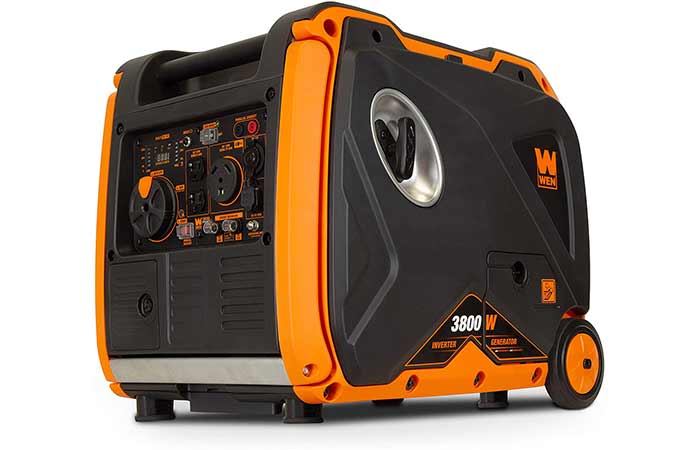
This 3000-watt generator from WEN is one of the quietest at only 57 decibels of noise. It’s quieter than an idling car. It’s also very fuel-efficient as it can run for 8.5 hours on 2.2 gallons of gasoline. We love the fact that it comes with 2 USB ports to charge your mobile devices.
4. Generac 7127 iQ3500-3500 Watt Portable Inverter Generator
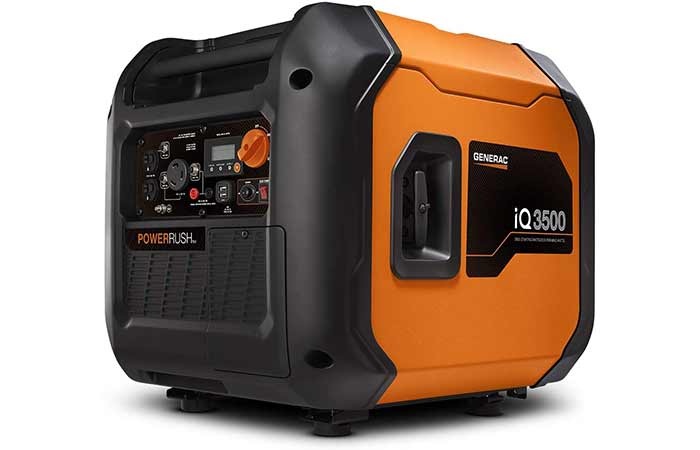
This entrant from Generac has a starting wattage of 3500 and a running wattage of 3000 watts. The iQ3500 portable inverter generator lets you bring power wherever you go – from tailgating parties to camping trips, the jobsite and beyond.
The durable, yet lightweight design is specifically engineered for easy portability. The intuitive Power Dial integrates the start, run and stop functions into one simple-to-use dial, along with Electric Start (battery included) capability, all conveniently located for quicker startup.
You can select from two engine speeds, depending on your need, to significantly reduce noise and fuel consumption, or to maximize power response. Generac is known for their affordable options and this one is no different as it is fairly priced.
5. Yamaha EF2000isV2
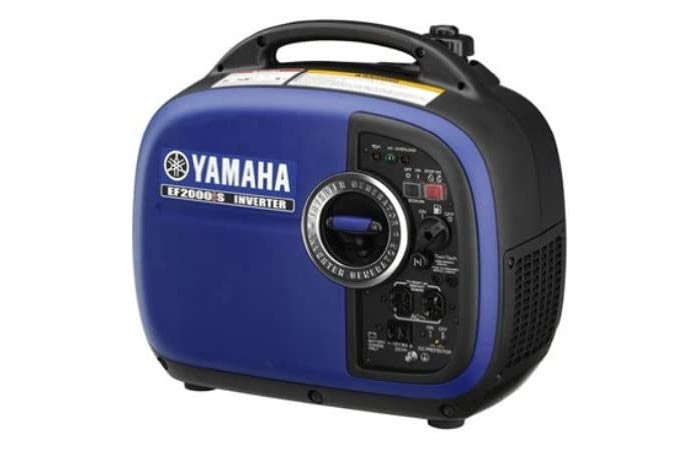
Providing up to 3500 watts of power, this Yamaha model is a lightweight option weighing only about 150 pounds. It’s also very efficient as it can run on less than 3 gallons of gasoline for 18 hours on end. It is, however, quite costly compared to the alternatives.
6. Honda EU7000is
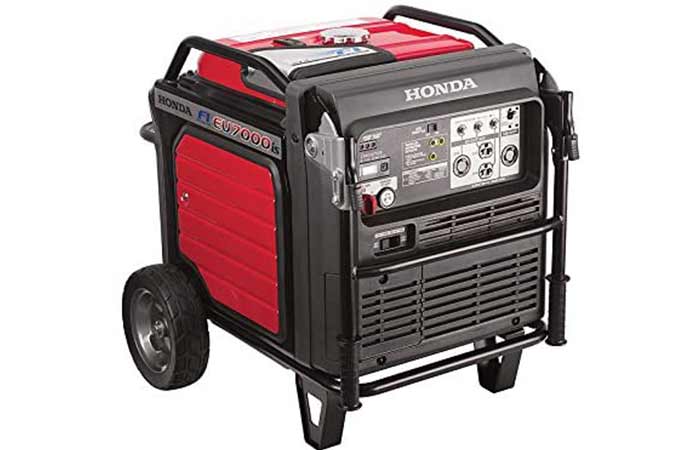
With power output of up to 20,000 watts, the Honda EU7000is generator is among the most powerful options for your freezer and fridge. It’s a large one and best used to power the whole house. The fact that it can run indefinitely on either gasoline or propane and comes on automatically when there’s a power outage makes it a wise buy.
7. Champion 100179
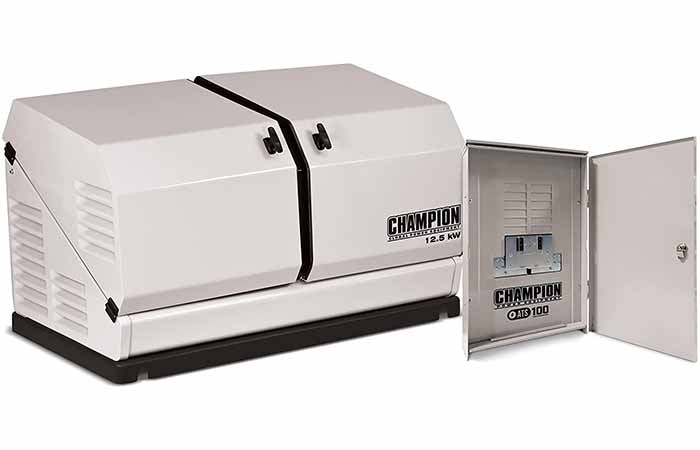
The Champion 100179 runs on both propane and gasoline with a power output of 12500 watts. It’s a quiet one and provides one of the most reliable power outputs thanks to the included inverter. With this generator, the only downside is the high cost compared to the alternatives.
8. c Portable Inverter Generator
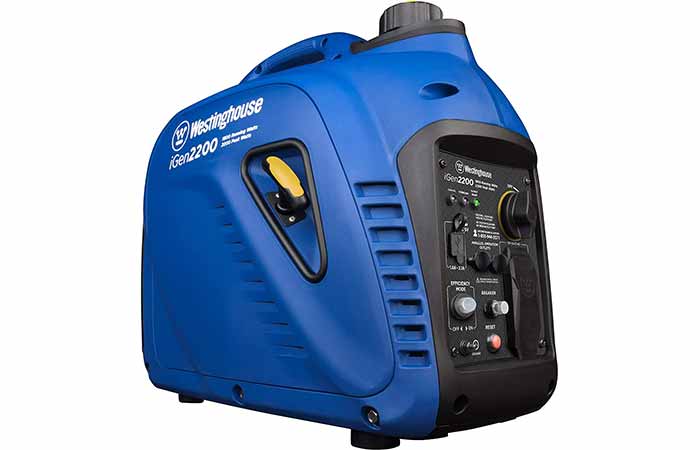
The iGen2200 unit has a power output of up to 2200 watts and is one of the most compact generators on the market. It has two 120V 20 Amp outlets and two USB ports as well. With only 52 decibels of noise, it’s also one of the quietest. Lastly, it has great fuel efficiency with 1.2 gallons running it for up to 12 hours.
These models are some of the best when it comes to getting stable and consistent power for your freezer or fridge. They also work well with other more delicate electronics due to having power inverters.
Further Reading
